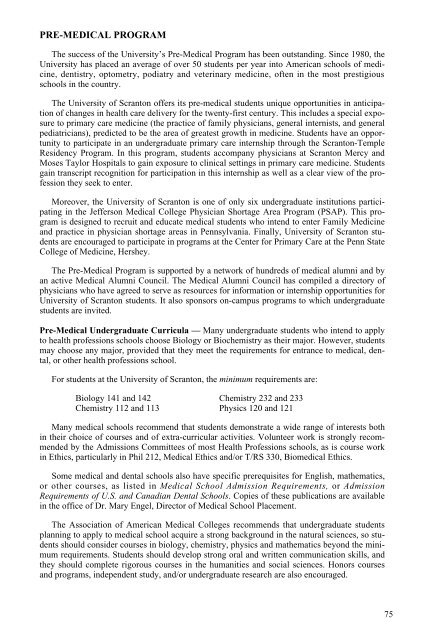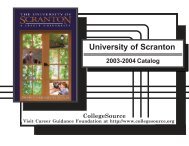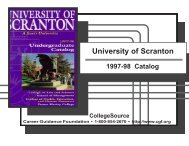You also want an ePaper? Increase the reach of your titles
YUMPU automatically turns print PDFs into web optimized ePapers that Google loves.
PRE-MEDICAL PROGRAM<br />
<strong>The</strong> success <strong>of</strong> the <strong>University</strong>’s Pre-Medical Program has been outstanding. Since 1980, the<br />
<strong>University</strong> has placed an average <strong>of</strong> over 50 students per year into American schools <strong>of</strong> medicine,<br />
dentistry, optometry, podiatry and veterinary medicine, <strong>of</strong>ten in the most prestigious<br />
schools in the country.<br />
<strong>The</strong> <strong>University</strong> <strong>of</strong> <strong>Scranton</strong> <strong>of</strong>fers its pre-medical students unique opportunities in anticipation<br />
<strong>of</strong> changes in health care delivery for the twenty-first century. This includes a special exposure<br />
to primary care medicine (the practice <strong>of</strong> family physicians, general internists, and general<br />
pediatricians), predicted to be the area <strong>of</strong> greatest growth in medicine. Students have an opportunity<br />
to participate in an undergraduate primary care internship through the <strong>Scranton</strong>-Temple<br />
Residency Program. In this program, students accompany physicians at <strong>Scranton</strong> Mercy and<br />
Moses Taylor Hospitals to gain exposure to clinical settings in primary care medicine. Students<br />
gain transcript recognition for participation in this internship as well as a clear view <strong>of</strong> the pr<strong>of</strong>ession<br />
they seek to enter.<br />
Moreover, the <strong>University</strong> <strong>of</strong> <strong>Scranton</strong> is one <strong>of</strong> only six undergraduate institutions participating<br />
in the Jefferson Medical College Physician Shortage Area Program (PSAP). This program<br />
is designed to recruit and educate medical students who intend to enter Family Medicine<br />
and practice in physician shortage areas in Pennsylvania. Finally, <strong>University</strong> <strong>of</strong> <strong>Scranton</strong> students<br />
are encouraged to participate in programs at the Center for Primary Care at the Penn State<br />
College <strong>of</strong> Medicine, Hershey.<br />
<strong>The</strong> Pre-Medical Program is supported by a network <strong>of</strong> hundreds <strong>of</strong> medical alumni and by<br />
an active Medical Alumni Council. <strong>The</strong> Medical Alumni Council has compiled a directory <strong>of</strong><br />
physicians who have agreed to serve as resources for information or internship opportunities for<br />
<strong>University</strong> <strong>of</strong> <strong>Scranton</strong> students. It also sponsors on-campus programs to which undergraduate<br />
students are invited.<br />
Pre-Medical Undergraduate Curricula — Many undergraduate students who intend to apply<br />
to health pr<strong>of</strong>essions schools choose Biology or Biochemistry as their major. However, students<br />
may choose any major, provided that they meet the requirements for entrance to medical, dental,<br />
or other health pr<strong>of</strong>essions school.<br />
For students at the <strong>University</strong> <strong>of</strong> <strong>Scranton</strong>, the minimum requirements are:<br />
Biology 141 and 142 Chemistry 232 and 233<br />
Chemistry 112 and 113 Physics 120 and 121<br />
Many medical schools recommend that students demonstrate a wide range <strong>of</strong> interests both<br />
in their choice <strong>of</strong> courses and <strong>of</strong> extra-curricular activities. Volunteer work is strongly recommended<br />
by the Admissions Committees <strong>of</strong> most Health Pr<strong>of</strong>essions schools, as is course work<br />
in Ethics, particularly in Phil 212, Medical Ethics and/or T/RS 330, Biomedical Ethics.<br />
Some medical and dental schools also have specific prerequisites for English, mathematics,<br />
or other courses, as listed in Medical School Admission Requirements, or Admission<br />
Requirements <strong>of</strong> U.S. and Canadian Dental Schools. Copies <strong>of</strong> these publications are available<br />
in the <strong>of</strong>fice <strong>of</strong> Dr. Mary Engel, Director <strong>of</strong> Medical School Placement.<br />
<strong>The</strong> Association <strong>of</strong> American Medical Colleges recommends that undergraduate students<br />
planning to apply to medical school acquire a strong background in the natural sciences, so students<br />
should consider courses in biology, chemistry, physics and mathematics beyond the minimum<br />
requirements. Students should develop strong oral and written communication skills, and<br />
they should complete rigorous courses in the humanities and social sciences. Honors courses<br />
and programs, independent study, and/or undergraduate research are also encouraged.<br />
75
















